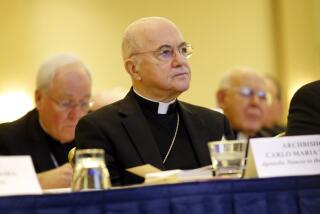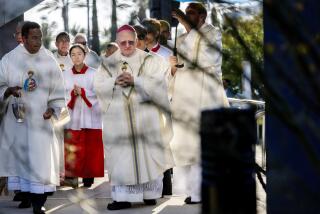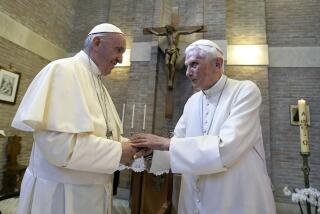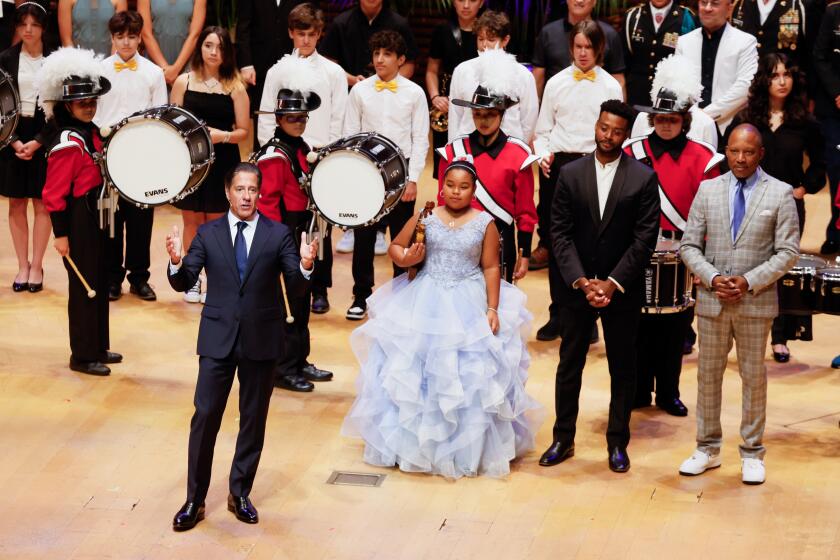For Cardinal Roger Mahony, social media is a powerful pulpit
As archbishop of Los Angeles, Roger Mahony responded to criticism of his handling of sexual abuse cases with a high-priced crisis management firm, full-page ads in Spanish and English newspapers, and a report naming accused priests.
In retirement, Mahony’s public relations operation consists mainly of his thoughts and a computer keyboard. Since last month, when outrage flared anew over files showing he shielded abusers, the cardinal has thrown himself into social media to give the public his side of the story.
It was on his blog that Mahony defended himself against a public rebuke by his successor, and it was on Twitter that he confirmed, to the dismay of many critics, that he would attend the conclave to elect a new pope.
“Am planning to be in Rome and vote for the next Pope,” he wrote hours after Pope Benedict XVI announced his resignation. He added, “Will be twee[t]ing daily.”
It was an extraordinary pledge from a man who had tweeted just five times before and only sporadically updated his blog. But as Catholic groups, members of the public and even some Vatican officials continued to question Mahony’s integrity, he became ever more prolific online.
From the Vatican on Monday, he posted his harshest assessment yet of those who have attacked him.
“I can’t recall a time such as now when people tend to be so judgmental and even self-righteous, so quick to accuse, judge and condemn,” he wrote. “And often with scant real facts and information.”
Since the release of 12,000 pages of confidential church records, Mahony has been lambasted by church critics, victims’ advocates and others. The criticism intensified with Benedict’s resignation and Mahony’s insistence that he would cast his vote for the next pope despite having been removed by Archbishop Jose Gomez from all public duties.
Last week, three former top Vatican officials publicly discussed the propriety of Mahony attending the conclave, and a liberal Catholic group gathered 10,000 signatures online urging the cardinal to give up his vote.
The debate over his presence only grew when a British cardinal, Keith O’Brien, decided to stay home following allegations that he had engaged in “inappropriate acts” with priests decades earlier.
“I do not wish media attention in Rome to be focused on me — but rather on Pope Benedict XVI and on his successor,” O’Brien said in a statement.
By contrast, Mahony has been reveling in his participation in the papal election, counting down the days and hours to his departure on his Twitter feed, slapping a Vatican City dateline on his first blog post after landing in Italy, and describing the “anticipation and expectation” on the streets there.
Mahony used Benedict’s announcement as an opportunity to talk to the public about something other than the sex abuse scandal and to assert his relevance to the church two years after his retirement. As a cardinal, Mahony gets to cast a vote; Gomez, the man who rebuked him, does not.
When news of the pope’s departure broke, Mahony quickly posted a personal tribute to Benedict on his blog and said he was looking forward to voting in the conclave. The post beat Gomez’s official statement by nearly an hour.
The post marked the start of a new level of social media engagement by Mahony. Since then, he has posted nearly daily on his blog and Twitter account.
“He obviously feels a need to be heard and understood,” said Diane Winston, a professor of media and religion at USC.
Mahony launched his blog in 2009 after attending a Vatican conference on social media and was for years an occasional poster. He frequently wrote about his longtime cause, immigration, but sometimes detoured, such as one entry extolling a pizza joint in Rome.
“My favorite is the one with fresh sliced mushrooms as the main topping!” he wrote in 2009.
His recent entries have been personal, spiritual and tinged with aggrievement. In a blog post this month, he wrote that he had a religious epiphany on Ash Wednesday. With “all the storms” of the sex abuse scandal, God was calling him “to be humiliated, disgraced and rebuffed by many.”
“In recent days, I have been confronted in various places by very unhappy people. I could understand the depth of their anger and outrage…,” he wrote. “Thanks to God’s special grace, I simply stood there, asking God to bless and forgive them.”
Mahony’s blog doesn’t allow readers to post responses, but Twitter does, and the feedback has often been harsh. When Mahony on Monday said the weather forecast for Rome was pleasant and rain-free, one user replied, “a good day to hide from your guilty past. #pedophile #protector.”
To a tweet in which Mahony discussed “loving your enemies,” another user wrote “You’re a good man. But this online pity party is unseemly. Don’t just praise the ‘silent Jesus’, act like him.”
Mahony has yet to respond to any tweets directed at him. Marketing and social media strategist David Meerman Scott said Mahony was practicing “one-way communication” rather than the dialogue that defines a successful online presence.
“He’s not engaging with the public, he’s talking to the public,” Scott said. But he added that if people find the cardinal’s posts to be genuine and forthcoming, they might come to see his perspective.
“It takes guts for people to put themselves out there.... It’s very easy to be quiet and say nothing,” he said.
At least nine other cardinals in the 116-member conclave have Twitter accounts. Cardinal Timothy Dolan of New York is the most widely followed, with more than 84,000 subscribers. Dolan, however, follows just one account — the pope’s. (Benedict, whose handle is @pontifex, counts more than 1.5 million followers.) After about a month of tweeting, Mahony has about 1,500 followers. He doesn’t follow the pope or Gomez, but follows the L.A. Times food section and Dr. Sanjay Gupta.
Mahony’s online missives will probably come to a temporary halt when he enters the Sistine Chapel next month to vote for the next pope. Those deliberations are secret, and the Vatican said this week that the penalty for revealing what happens during the conclave is excommunication.
More to Read
Sign up for Essential California
The most important California stories and recommendations in your inbox every morning.
You may occasionally receive promotional content from the Los Angeles Times.








